Evaluating CISG and English Law on Contract Performance
VerifiedAdded on 2023/04/23
|26
|8128
|126
Essay
AI Summary
This essay provides a comprehensive analysis of the Convention on Contracts for the International Sale of Goods (CISG) and English law, focusing on their differing approaches to promoting contract performance, particularly in situations involving a breach by the seller. The study begins by outlining the origins, development, and key characteristics of the CISG as a uniform international legal framework, contrasting it with the common law-based English legal system. It delves into the specifics of contract law, performance obligations, and remedies for breach of contract under both systems, highlighting the CISG's emphasis on upholding the contract even when the seller is in breach, while English law may offer more flexibility. The essay critically examines the statement that the CISG places too much emphasis on promoting performance despite a breach, arguing the nuances of each system and their implications for international trade. The conclusion synthesizes the arguments, offering a balanced perspective on the strengths and weaknesses of both the CISG and English law in addressing contract performance and breach of contract scenarios.

“The CISG, Unlike English Law, Places Too Much Emphasis on Promoting
Performance of the Contract despite a Breach by the Seller”
Page 1
Performance of the Contract despite a Breach by the Seller”
Page 1
Paraphrase This Document
Need a fresh take? Get an instant paraphrase of this document with our AI Paraphraser
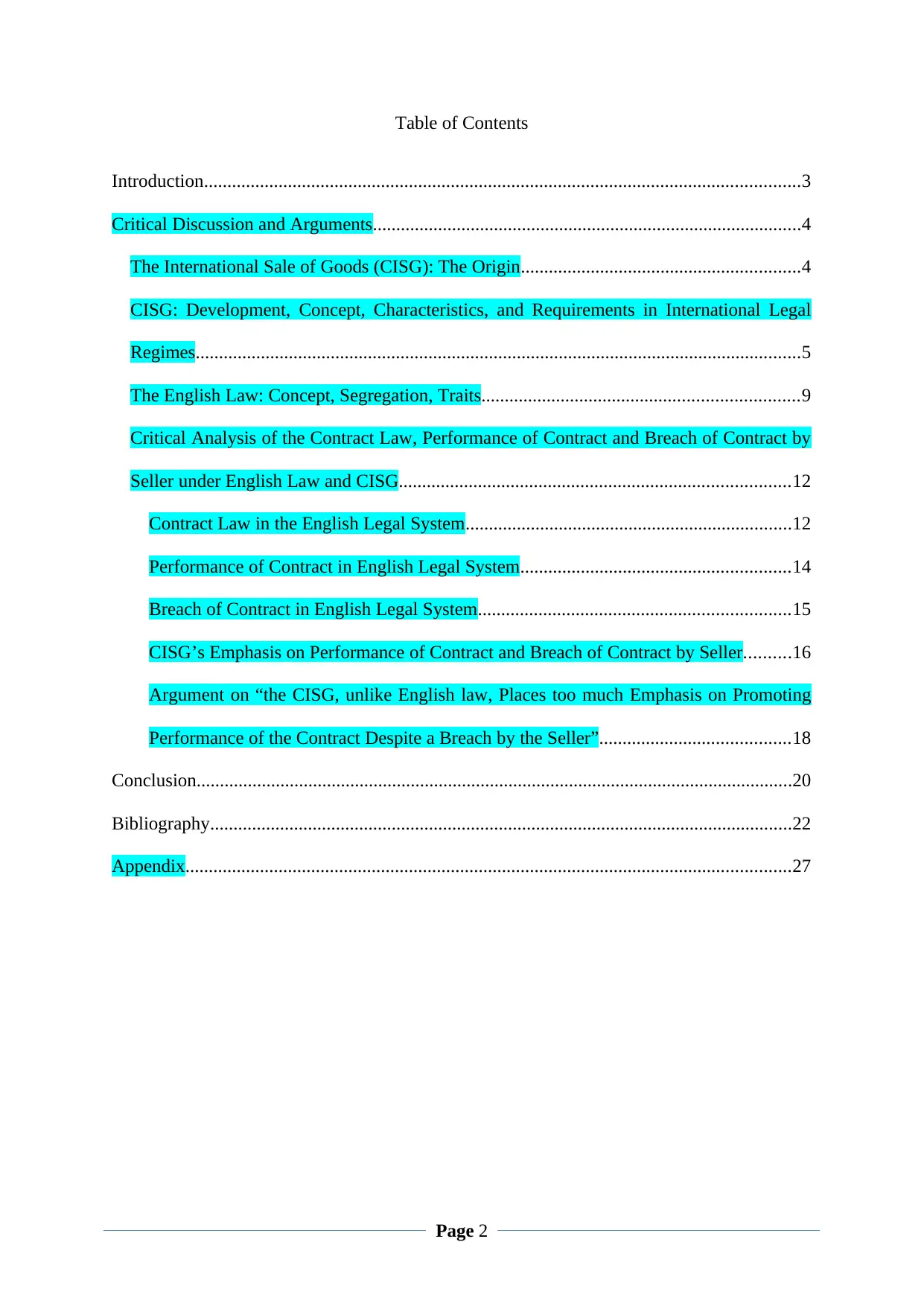
Table of Contents
Introduction................................................................................................................................3
Critical Discussion and Arguments............................................................................................4
The International Sale of Goods (CISG): The Origin............................................................4
CISG: Development, Concept, Characteristics, and Requirements in International Legal
Regimes..................................................................................................................................5
The English Law: Concept, Segregation, Traits....................................................................9
Critical Analysis of the Contract Law, Performance of Contract and Breach of Contract by
Seller under English Law and CISG....................................................................................12
Contract Law in the English Legal System......................................................................12
Performance of Contract in English Legal System..........................................................14
Breach of Contract in English Legal System...................................................................15
CISG’s Emphasis on Performance of Contract and Breach of Contract by Seller..........16
Argument on “the CISG, unlike English law, Places too much Emphasis on Promoting
Performance of the Contract Despite a Breach by the Seller”.........................................18
Conclusion................................................................................................................................20
Bibliography.............................................................................................................................22
Appendix..................................................................................................................................27
Page 2
Introduction................................................................................................................................3
Critical Discussion and Arguments............................................................................................4
The International Sale of Goods (CISG): The Origin............................................................4
CISG: Development, Concept, Characteristics, and Requirements in International Legal
Regimes..................................................................................................................................5
The English Law: Concept, Segregation, Traits....................................................................9
Critical Analysis of the Contract Law, Performance of Contract and Breach of Contract by
Seller under English Law and CISG....................................................................................12
Contract Law in the English Legal System......................................................................12
Performance of Contract in English Legal System..........................................................14
Breach of Contract in English Legal System...................................................................15
CISG’s Emphasis on Performance of Contract and Breach of Contract by Seller..........16
Argument on “the CISG, unlike English law, Places too much Emphasis on Promoting
Performance of the Contract Despite a Breach by the Seller”.........................................18
Conclusion................................................................................................................................20
Bibliography.............................................................................................................................22
Appendix..................................................................................................................................27
Page 2
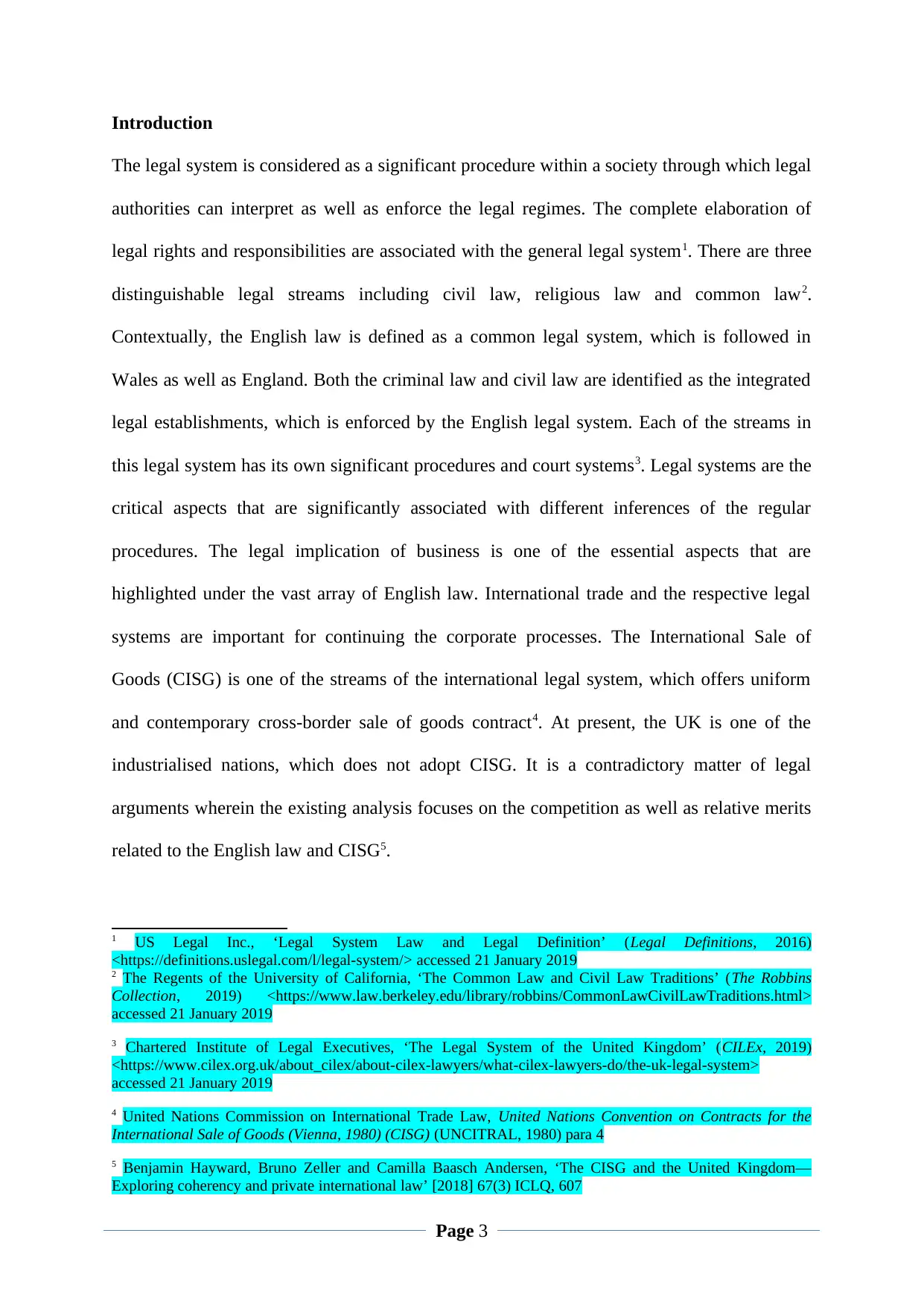
Introduction
The legal system is considered as a significant procedure within a society through which legal
authorities can interpret as well as enforce the legal regimes. The complete elaboration of
legal rights and responsibilities are associated with the general legal system1. There are three
distinguishable legal streams including civil law, religious law and common law2.
Contextually, the English law is defined as a common legal system, which is followed in
Wales as well as England. Both the criminal law and civil law are identified as the integrated
legal establishments, which is enforced by the English legal system. Each of the streams in
this legal system has its own significant procedures and court systems3. Legal systems are the
critical aspects that are significantly associated with different inferences of the regular
procedures. The legal implication of business is one of the essential aspects that are
highlighted under the vast array of English law. International trade and the respective legal
systems are important for continuing the corporate processes. The International Sale of
Goods (CISG) is one of the streams of the international legal system, which offers uniform
and contemporary cross-border sale of goods contract4. At present, the UK is one of the
industrialised nations, which does not adopt CISG. It is a contradictory matter of legal
arguments wherein the existing analysis focuses on the competition as well as relative merits
related to the English law and CISG5.
1 US Legal Inc., ‘Legal System Law and Legal Definition’ (Legal Definitions, 2016)
<https://definitions.uslegal.com/l/legal-system/> accessed 21 January 2019
2 The Regents of the University of California, ‘The Common Law and Civil Law Traditions’ (The Robbins
Collection, 2019) <https://www.law.berkeley.edu/library/robbins/CommonLawCivilLawTraditions.html>
accessed 21 January 2019
3 Chartered Institute of Legal Executives, ‘The Legal System of the United Kingdom’ (CILEx, 2019)
<https://www.cilex.org.uk/about_cilex/about-cilex-lawyers/what-cilex-lawyers-do/the-uk-legal-system>
accessed 21 January 2019
4 United Nations Commission on International Trade Law, United Nations Convention on Contracts for the
International Sale of Goods (Vienna, 1980) (CISG) (UNCITRAL, 1980) para 4
5 Benjamin Hayward, Bruno Zeller and Camilla Baasch Andersen, ‘The CISG and the United Kingdom—
Exploring coherency and private international law’ [2018] 67(3) ICLQ, 607
Page 3
The legal system is considered as a significant procedure within a society through which legal
authorities can interpret as well as enforce the legal regimes. The complete elaboration of
legal rights and responsibilities are associated with the general legal system1. There are three
distinguishable legal streams including civil law, religious law and common law2.
Contextually, the English law is defined as a common legal system, which is followed in
Wales as well as England. Both the criminal law and civil law are identified as the integrated
legal establishments, which is enforced by the English legal system. Each of the streams in
this legal system has its own significant procedures and court systems3. Legal systems are the
critical aspects that are significantly associated with different inferences of the regular
procedures. The legal implication of business is one of the essential aspects that are
highlighted under the vast array of English law. International trade and the respective legal
systems are important for continuing the corporate processes. The International Sale of
Goods (CISG) is one of the streams of the international legal system, which offers uniform
and contemporary cross-border sale of goods contract4. At present, the UK is one of the
industrialised nations, which does not adopt CISG. It is a contradictory matter of legal
arguments wherein the existing analysis focuses on the competition as well as relative merits
related to the English law and CISG5.
1 US Legal Inc., ‘Legal System Law and Legal Definition’ (Legal Definitions, 2016)
<https://definitions.uslegal.com/l/legal-system/> accessed 21 January 2019
2 The Regents of the University of California, ‘The Common Law and Civil Law Traditions’ (The Robbins
Collection, 2019) <https://www.law.berkeley.edu/library/robbins/CommonLawCivilLawTraditions.html>
accessed 21 January 2019
3 Chartered Institute of Legal Executives, ‘The Legal System of the United Kingdom’ (CILEx, 2019)
<https://www.cilex.org.uk/about_cilex/about-cilex-lawyers/what-cilex-lawyers-do/the-uk-legal-system>
accessed 21 January 2019
4 United Nations Commission on International Trade Law, United Nations Convention on Contracts for the
International Sale of Goods (Vienna, 1980) (CISG) (UNCITRAL, 1980) para 4
5 Benjamin Hayward, Bruno Zeller and Camilla Baasch Andersen, ‘The CISG and the United Kingdom—
Exploring coherency and private international law’ [2018] 67(3) ICLQ, 607
Page 3
⊘ This is a preview!⊘
Do you want full access?
Subscribe today to unlock all pages.

Trusted by 1+ million students worldwide
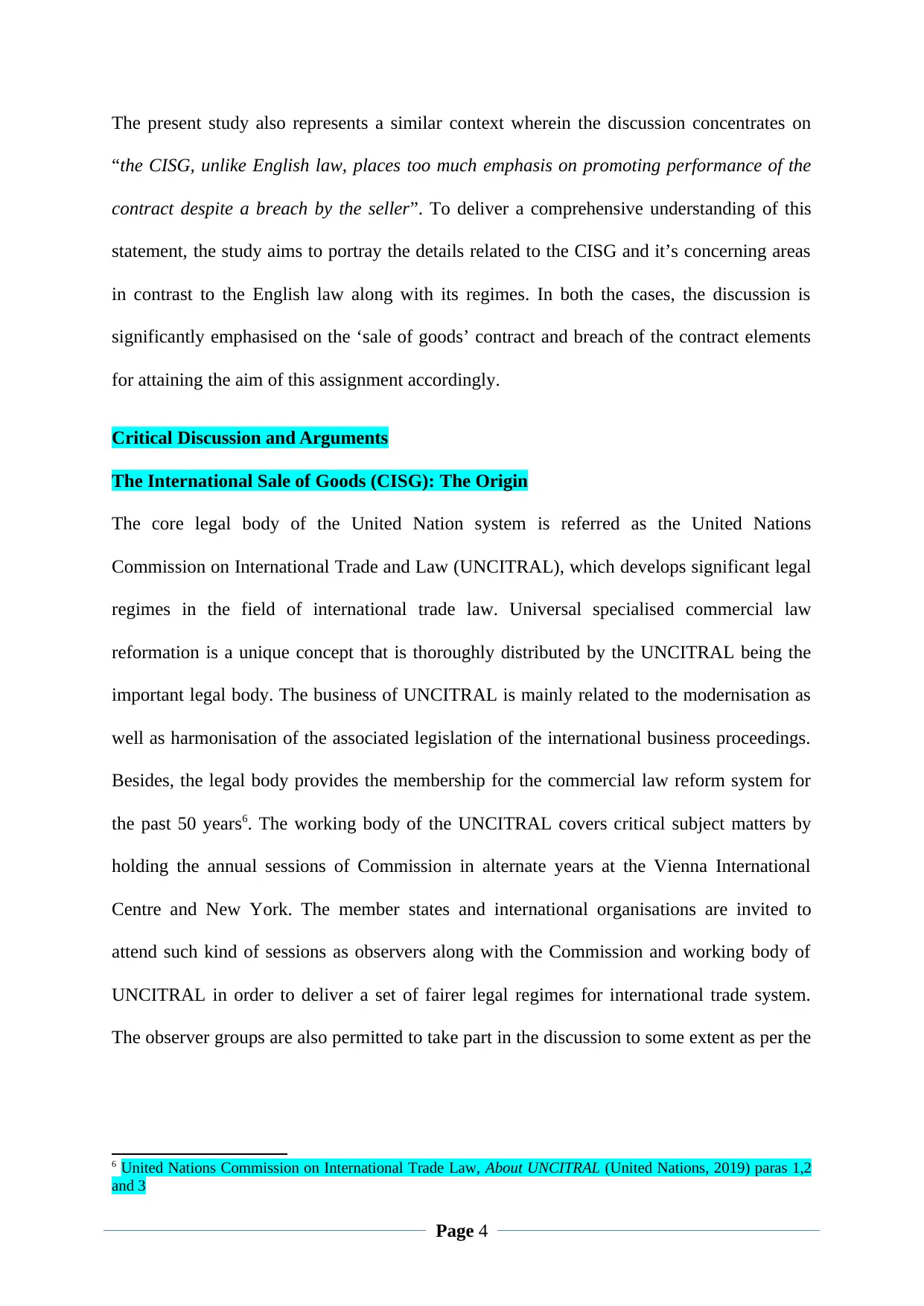
The present study also represents a similar context wherein the discussion concentrates on
“the CISG, unlike English law, places too much emphasis on promoting performance of the
contract despite a breach by the seller”. To deliver a comprehensive understanding of this
statement, the study aims to portray the details related to the CISG and it’s concerning areas
in contrast to the English law along with its regimes. In both the cases, the discussion is
significantly emphasised on the ‘sale of goods’ contract and breach of the contract elements
for attaining the aim of this assignment accordingly.
Critical Discussion and Arguments
The International Sale of Goods (CISG): The Origin
The core legal body of the United Nation system is referred as the United Nations
Commission on International Trade and Law (UNCITRAL), which develops significant legal
regimes in the field of international trade law. Universal specialised commercial law
reformation is a unique concept that is thoroughly distributed by the UNCITRAL being the
important legal body. The business of UNCITRAL is mainly related to the modernisation as
well as harmonisation of the associated legislation of the international business proceedings.
Besides, the legal body provides the membership for the commercial law reform system for
the past 50 years6. The working body of the UNCITRAL covers critical subject matters by
holding the annual sessions of Commission in alternate years at the Vienna International
Centre and New York. The member states and international organisations are invited to
attend such kind of sessions as observers along with the Commission and working body of
UNCITRAL in order to deliver a set of fairer legal regimes for international trade system.
The observer groups are also permitted to take part in the discussion to some extent as per the
6 United Nations Commission on International Trade Law, About UNCITRAL (United Nations, 2019) paras 1,2
and 3
Page 4
“the CISG, unlike English law, places too much emphasis on promoting performance of the
contract despite a breach by the seller”. To deliver a comprehensive understanding of this
statement, the study aims to portray the details related to the CISG and it’s concerning areas
in contrast to the English law along with its regimes. In both the cases, the discussion is
significantly emphasised on the ‘sale of goods’ contract and breach of the contract elements
for attaining the aim of this assignment accordingly.
Critical Discussion and Arguments
The International Sale of Goods (CISG): The Origin
The core legal body of the United Nation system is referred as the United Nations
Commission on International Trade and Law (UNCITRAL), which develops significant legal
regimes in the field of international trade law. Universal specialised commercial law
reformation is a unique concept that is thoroughly distributed by the UNCITRAL being the
important legal body. The business of UNCITRAL is mainly related to the modernisation as
well as harmonisation of the associated legislation of the international business proceedings.
Besides, the legal body provides the membership for the commercial law reform system for
the past 50 years6. The working body of the UNCITRAL covers critical subject matters by
holding the annual sessions of Commission in alternate years at the Vienna International
Centre and New York. The member states and international organisations are invited to
attend such kind of sessions as observers along with the Commission and working body of
UNCITRAL in order to deliver a set of fairer legal regimes for international trade system.
The observer groups are also permitted to take part in the discussion to some extent as per the
6 United Nations Commission on International Trade Law, About UNCITRAL (United Nations, 2019) paras 1,2
and 3
Page 4
Paraphrase This Document
Need a fresh take? Get an instant paraphrase of this document with our AI Paraphraser
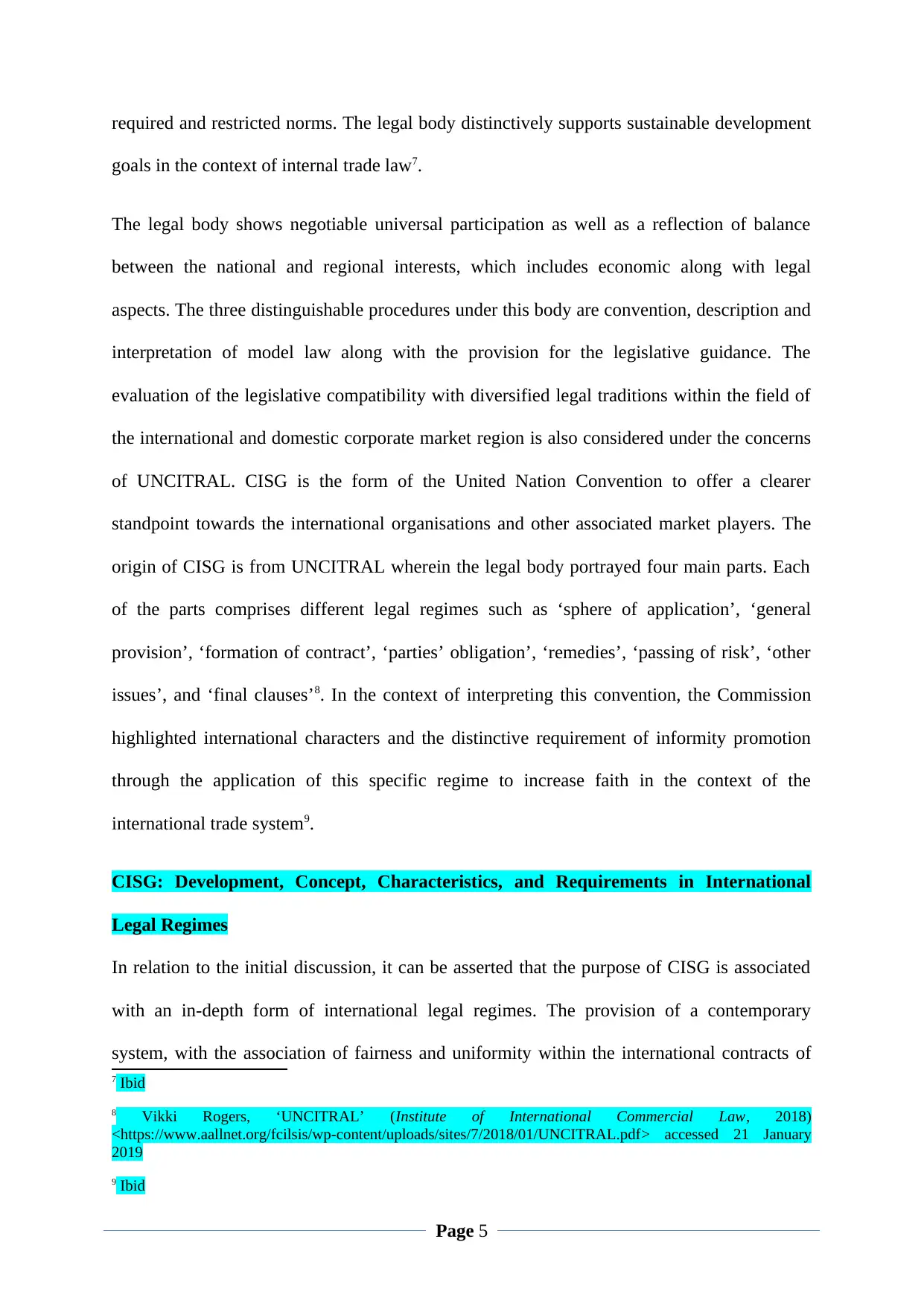
required and restricted norms. The legal body distinctively supports sustainable development
goals in the context of internal trade law7.
The legal body shows negotiable universal participation as well as a reflection of balance
between the national and regional interests, which includes economic along with legal
aspects. The three distinguishable procedures under this body are convention, description and
interpretation of model law along with the provision for the legislative guidance. The
evaluation of the legislative compatibility with diversified legal traditions within the field of
the international and domestic corporate market region is also considered under the concerns
of UNCITRAL. CISG is the form of the United Nation Convention to offer a clearer
standpoint towards the international organisations and other associated market players. The
origin of CISG is from UNCITRAL wherein the legal body portrayed four main parts. Each
of the parts comprises different legal regimes such as ‘sphere of application’, ‘general
provision’, ‘formation of contract’, ‘parties’ obligation’, ‘remedies’, ‘passing of risk’, ‘other
issues’, and ‘final clauses’8. In the context of interpreting this convention, the Commission
highlighted international characters and the distinctive requirement of informity promotion
through the application of this specific regime to increase faith in the context of the
international trade system9.
CISG: Development, Concept, Characteristics, and Requirements in International
Legal Regimes
In relation to the initial discussion, it can be asserted that the purpose of CISG is associated
with an in-depth form of international legal regimes. The provision of a contemporary
system, with the association of fairness and uniformity within the international contracts of
7 Ibid
8 Vikki Rogers, ‘UNCITRAL’ (Institute of International Commercial Law, 2018)
<https://www.aallnet.org/fcilsis/wp-content/uploads/sites/7/2018/01/UNCITRAL.pdf> accessed 21 January
2019
9 Ibid
Page 5
goals in the context of internal trade law7.
The legal body shows negotiable universal participation as well as a reflection of balance
between the national and regional interests, which includes economic along with legal
aspects. The three distinguishable procedures under this body are convention, description and
interpretation of model law along with the provision for the legislative guidance. The
evaluation of the legislative compatibility with diversified legal traditions within the field of
the international and domestic corporate market region is also considered under the concerns
of UNCITRAL. CISG is the form of the United Nation Convention to offer a clearer
standpoint towards the international organisations and other associated market players. The
origin of CISG is from UNCITRAL wherein the legal body portrayed four main parts. Each
of the parts comprises different legal regimes such as ‘sphere of application’, ‘general
provision’, ‘formation of contract’, ‘parties’ obligation’, ‘remedies’, ‘passing of risk’, ‘other
issues’, and ‘final clauses’8. In the context of interpreting this convention, the Commission
highlighted international characters and the distinctive requirement of informity promotion
through the application of this specific regime to increase faith in the context of the
international trade system9.
CISG: Development, Concept, Characteristics, and Requirements in International
Legal Regimes
In relation to the initial discussion, it can be asserted that the purpose of CISG is associated
with an in-depth form of international legal regimes. The provision of a contemporary
system, with the association of fairness and uniformity within the international contracts of
7 Ibid
8 Vikki Rogers, ‘UNCITRAL’ (Institute of International Commercial Law, 2018)
<https://www.aallnet.org/fcilsis/wp-content/uploads/sites/7/2018/01/UNCITRAL.pdf> accessed 21 January
2019
9 Ibid
Page 5
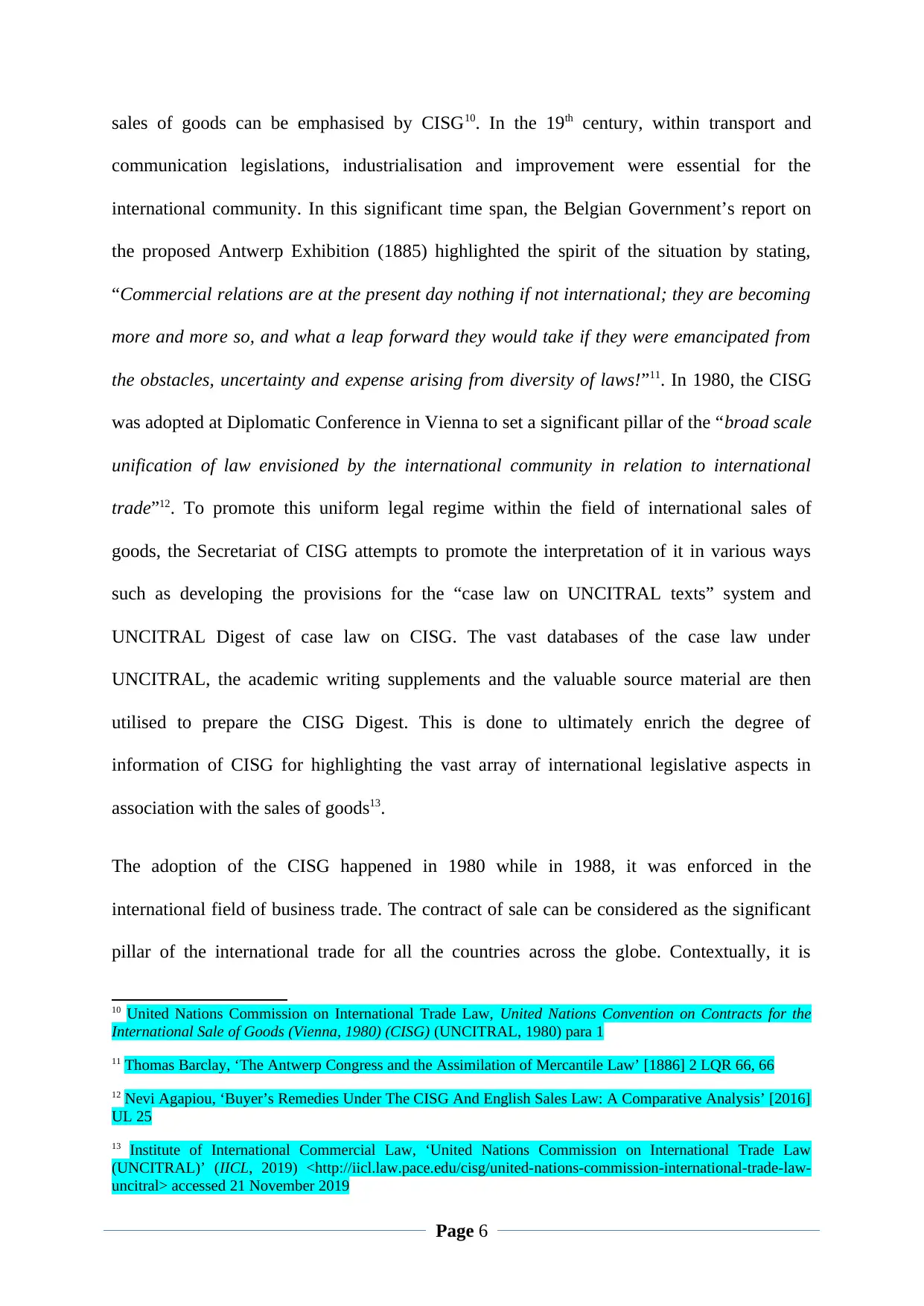
sales of goods can be emphasised by CISG10. In the 19th century, within transport and
communication legislations, industrialisation and improvement were essential for the
international community. In this significant time span, the Belgian Government’s report on
the proposed Antwerp Exhibition (1885) highlighted the spirit of the situation by stating,
“Commercial relations are at the present day nothing if not international; they are becoming
more and more so, and what a leap forward they would take if they were emancipated from
the obstacles, uncertainty and expense arising from diversity of laws!”11. In 1980, the CISG
was adopted at Diplomatic Conference in Vienna to set a significant pillar of the “broad scale
unification of law envisioned by the international community in relation to international
trade”12. To promote this uniform legal regime within the field of international sales of
goods, the Secretariat of CISG attempts to promote the interpretation of it in various ways
such as developing the provisions for the “case law on UNCITRAL texts” system and
UNCITRAL Digest of case law on CISG. The vast databases of the case law under
UNCITRAL, the academic writing supplements and the valuable source material are then
utilised to prepare the CISG Digest. This is done to ultimately enrich the degree of
information of CISG for highlighting the vast array of international legislative aspects in
association with the sales of goods13.
The adoption of the CISG happened in 1980 while in 1988, it was enforced in the
international field of business trade. The contract of sale can be considered as the significant
pillar of the international trade for all the countries across the globe. Contextually, it is
10 United Nations Commission on International Trade Law, United Nations Convention on Contracts for the
International Sale of Goods (Vienna, 1980) (CISG) (UNCITRAL, 1980) para 1
11 Thomas Barclay, ‘The Antwerp Congress and the Assimilation of Mercantile Law’ [1886] 2 LQR 66, 66
12 Nevi Agapiou, ‘Buyer’s Remedies Under The CISG And English Sales Law: A Comparative Analysis’ [2016]
UL 25
13 Institute of International Commercial Law, ‘United Nations Commission on International Trade Law
(UNCITRAL)’ (IICL, 2019) <http://iicl.law.pace.edu/cisg/united-nations-commission-international-trade-law-
uncitral> accessed 21 November 2019
Page 6
communication legislations, industrialisation and improvement were essential for the
international community. In this significant time span, the Belgian Government’s report on
the proposed Antwerp Exhibition (1885) highlighted the spirit of the situation by stating,
“Commercial relations are at the present day nothing if not international; they are becoming
more and more so, and what a leap forward they would take if they were emancipated from
the obstacles, uncertainty and expense arising from diversity of laws!”11. In 1980, the CISG
was adopted at Diplomatic Conference in Vienna to set a significant pillar of the “broad scale
unification of law envisioned by the international community in relation to international
trade”12. To promote this uniform legal regime within the field of international sales of
goods, the Secretariat of CISG attempts to promote the interpretation of it in various ways
such as developing the provisions for the “case law on UNCITRAL texts” system and
UNCITRAL Digest of case law on CISG. The vast databases of the case law under
UNCITRAL, the academic writing supplements and the valuable source material are then
utilised to prepare the CISG Digest. This is done to ultimately enrich the degree of
information of CISG for highlighting the vast array of international legislative aspects in
association with the sales of goods13.
The adoption of the CISG happened in 1980 while in 1988, it was enforced in the
international field of business trade. The contract of sale can be considered as the significant
pillar of the international trade for all the countries across the globe. Contextually, it is
10 United Nations Commission on International Trade Law, United Nations Convention on Contracts for the
International Sale of Goods (Vienna, 1980) (CISG) (UNCITRAL, 1980) para 1
11 Thomas Barclay, ‘The Antwerp Congress and the Assimilation of Mercantile Law’ [1886] 2 LQR 66, 66
12 Nevi Agapiou, ‘Buyer’s Remedies Under The CISG And English Sales Law: A Comparative Analysis’ [2016]
UL 25
13 Institute of International Commercial Law, ‘United Nations Commission on International Trade Law
(UNCITRAL)’ (IICL, 2019) <http://iicl.law.pace.edu/cisg/united-nations-commission-international-trade-law-
uncitral> accessed 21 November 2019
Page 6
⊘ This is a preview!⊘
Do you want full access?
Subscribe today to unlock all pages.

Trusted by 1+ million students worldwide
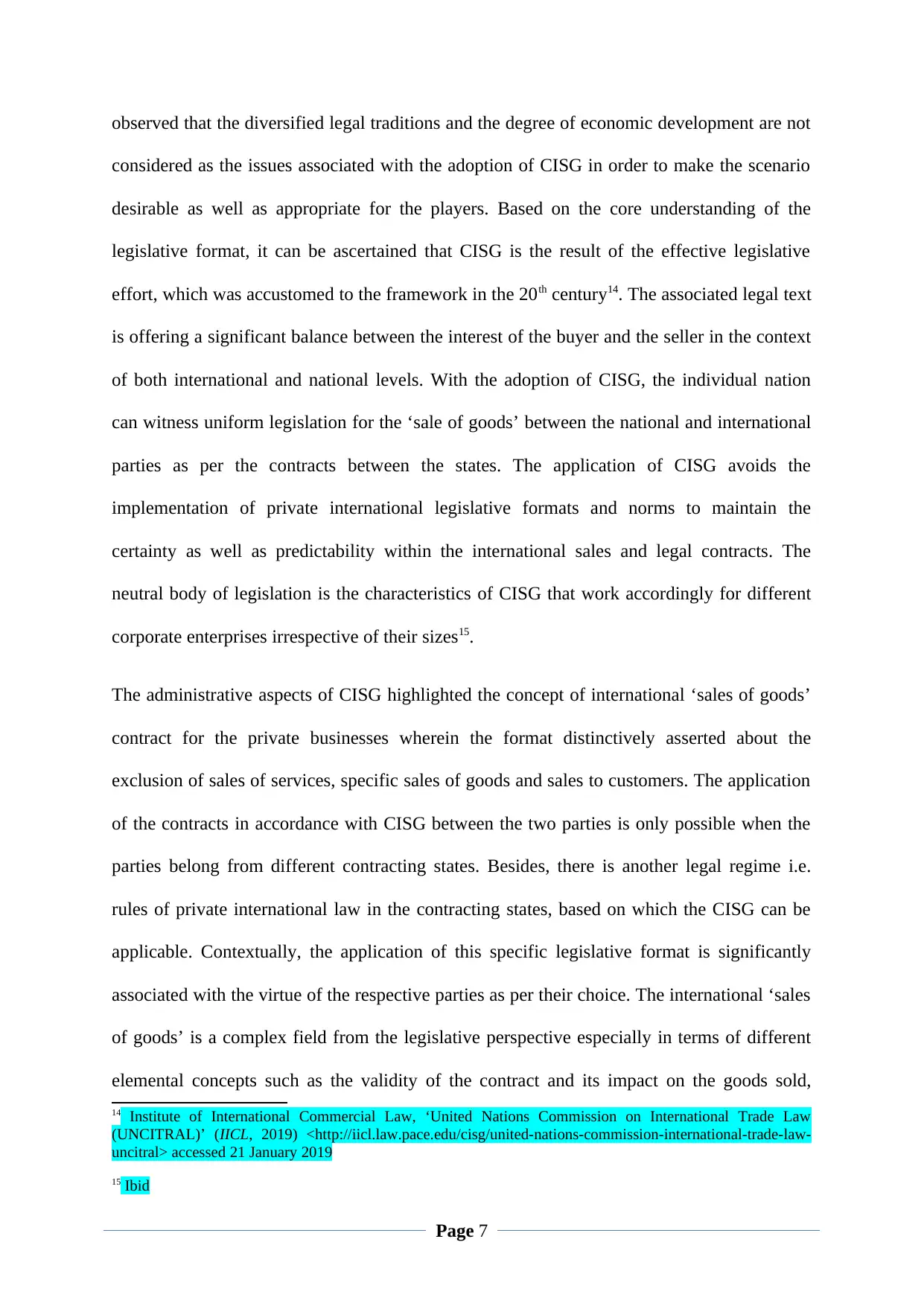
observed that the diversified legal traditions and the degree of economic development are not
considered as the issues associated with the adoption of CISG in order to make the scenario
desirable as well as appropriate for the players. Based on the core understanding of the
legislative format, it can be ascertained that CISG is the result of the effective legislative
effort, which was accustomed to the framework in the 20th century14. The associated legal text
is offering a significant balance between the interest of the buyer and the seller in the context
of both international and national levels. With the adoption of CISG, the individual nation
can witness uniform legislation for the ‘sale of goods’ between the national and international
parties as per the contracts between the states. The application of CISG avoids the
implementation of private international legislative formats and norms to maintain the
certainty as well as predictability within the international sales and legal contracts. The
neutral body of legislation is the characteristics of CISG that work accordingly for different
corporate enterprises irrespective of their sizes15.
The administrative aspects of CISG highlighted the concept of international ‘sales of goods’
contract for the private businesses wherein the format distinctively asserted about the
exclusion of sales of services, specific sales of goods and sales to customers. The application
of the contracts in accordance with CISG between the two parties is only possible when the
parties belong from different contracting states. Besides, there is another legal regime i.e.
rules of private international law in the contracting states, based on which the CISG can be
applicable. Contextually, the application of this specific legislative format is significantly
associated with the virtue of the respective parties as per their choice. The international ‘sales
of goods’ is a complex field from the legislative perspective especially in terms of different
elemental concepts such as the validity of the contract and its impact on the goods sold,
14 Institute of International Commercial Law, ‘United Nations Commission on International Trade Law
(UNCITRAL)’ (IICL, 2019) <http://iicl.law.pace.edu/cisg/united-nations-commission-international-trade-law-
uncitral> accessed 21 January 2019
15 Ibid
Page 7
considered as the issues associated with the adoption of CISG in order to make the scenario
desirable as well as appropriate for the players. Based on the core understanding of the
legislative format, it can be ascertained that CISG is the result of the effective legislative
effort, which was accustomed to the framework in the 20th century14. The associated legal text
is offering a significant balance between the interest of the buyer and the seller in the context
of both international and national levels. With the adoption of CISG, the individual nation
can witness uniform legislation for the ‘sale of goods’ between the national and international
parties as per the contracts between the states. The application of CISG avoids the
implementation of private international legislative formats and norms to maintain the
certainty as well as predictability within the international sales and legal contracts. The
neutral body of legislation is the characteristics of CISG that work accordingly for different
corporate enterprises irrespective of their sizes15.
The administrative aspects of CISG highlighted the concept of international ‘sales of goods’
contract for the private businesses wherein the format distinctively asserted about the
exclusion of sales of services, specific sales of goods and sales to customers. The application
of the contracts in accordance with CISG between the two parties is only possible when the
parties belong from different contracting states. Besides, there is another legal regime i.e.
rules of private international law in the contracting states, based on which the CISG can be
applicable. Contextually, the application of this specific legislative format is significantly
associated with the virtue of the respective parties as per their choice. The international ‘sales
of goods’ is a complex field from the legislative perspective especially in terms of different
elemental concepts such as the validity of the contract and its impact on the goods sold,
14 Institute of International Commercial Law, ‘United Nations Commission on International Trade Law
(UNCITRAL)’ (IICL, 2019) <http://iicl.law.pace.edu/cisg/united-nations-commission-international-trade-law-
uncitral> accessed 21 January 2019
15 Ibid
Page 7
Paraphrase This Document
Need a fresh take? Get an instant paraphrase of this document with our AI Paraphraser
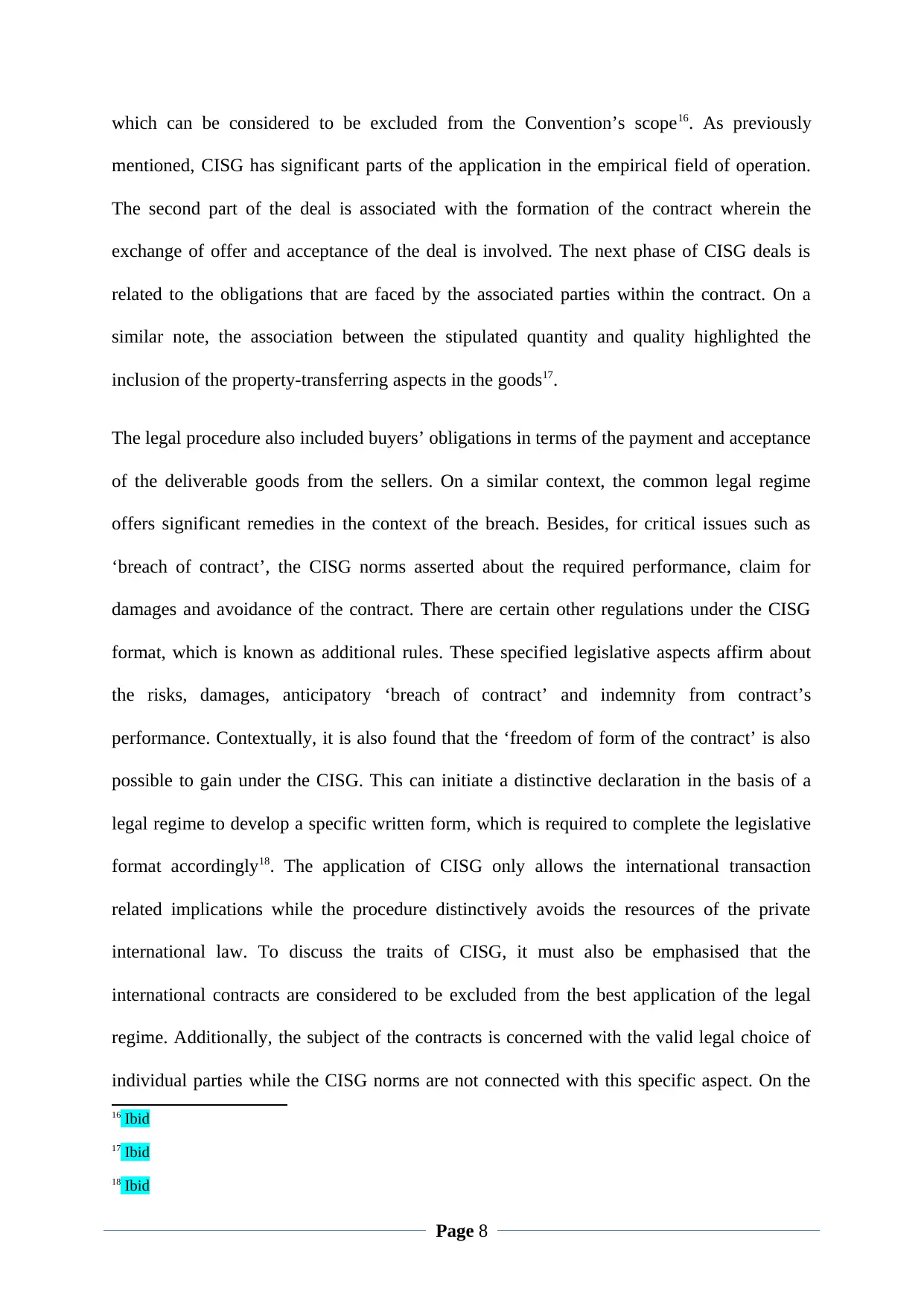
which can be considered to be excluded from the Convention’s scope16. As previously
mentioned, CISG has significant parts of the application in the empirical field of operation.
The second part of the deal is associated with the formation of the contract wherein the
exchange of offer and acceptance of the deal is involved. The next phase of CISG deals is
related to the obligations that are faced by the associated parties within the contract. On a
similar note, the association between the stipulated quantity and quality highlighted the
inclusion of the property-transferring aspects in the goods17.
The legal procedure also included buyers’ obligations in terms of the payment and acceptance
of the deliverable goods from the sellers. On a similar context, the common legal regime
offers significant remedies in the context of the breach. Besides, for critical issues such as
‘breach of contract’, the CISG norms asserted about the required performance, claim for
damages and avoidance of the contract. There are certain other regulations under the CISG
format, which is known as additional rules. These specified legislative aspects affirm about
the risks, damages, anticipatory ‘breach of contract’ and indemnity from contract’s
performance. Contextually, it is also found that the ‘freedom of form of the contract’ is also
possible to gain under the CISG. This can initiate a distinctive declaration in the basis of a
legal regime to develop a specific written form, which is required to complete the legislative
format accordingly18. The application of CISG only allows the international transaction
related implications while the procedure distinctively avoids the resources of the private
international law. To discuss the traits of CISG, it must also be emphasised that the
international contracts are considered to be excluded from the best application of the legal
regime. Additionally, the subject of the contracts is concerned with the valid legal choice of
individual parties while the CISG norms are not connected with this specific aspect. On the
16 Ibid
17 Ibid
18 Ibid
Page 8
mentioned, CISG has significant parts of the application in the empirical field of operation.
The second part of the deal is associated with the formation of the contract wherein the
exchange of offer and acceptance of the deal is involved. The next phase of CISG deals is
related to the obligations that are faced by the associated parties within the contract. On a
similar note, the association between the stipulated quantity and quality highlighted the
inclusion of the property-transferring aspects in the goods17.
The legal procedure also included buyers’ obligations in terms of the payment and acceptance
of the deliverable goods from the sellers. On a similar context, the common legal regime
offers significant remedies in the context of the breach. Besides, for critical issues such as
‘breach of contract’, the CISG norms asserted about the required performance, claim for
damages and avoidance of the contract. There are certain other regulations under the CISG
format, which is known as additional rules. These specified legislative aspects affirm about
the risks, damages, anticipatory ‘breach of contract’ and indemnity from contract’s
performance. Contextually, it is also found that the ‘freedom of form of the contract’ is also
possible to gain under the CISG. This can initiate a distinctive declaration in the basis of a
legal regime to develop a specific written form, which is required to complete the legislative
format accordingly18. The application of CISG only allows the international transaction
related implications while the procedure distinctively avoids the resources of the private
international law. To discuss the traits of CISG, it must also be emphasised that the
international contracts are considered to be excluded from the best application of the legal
regime. Additionally, the subject of the contracts is concerned with the valid legal choice of
individual parties while the CISG norms are not connected with this specific aspect. On the
16 Ibid
17 Ibid
18 Ibid
Page 8
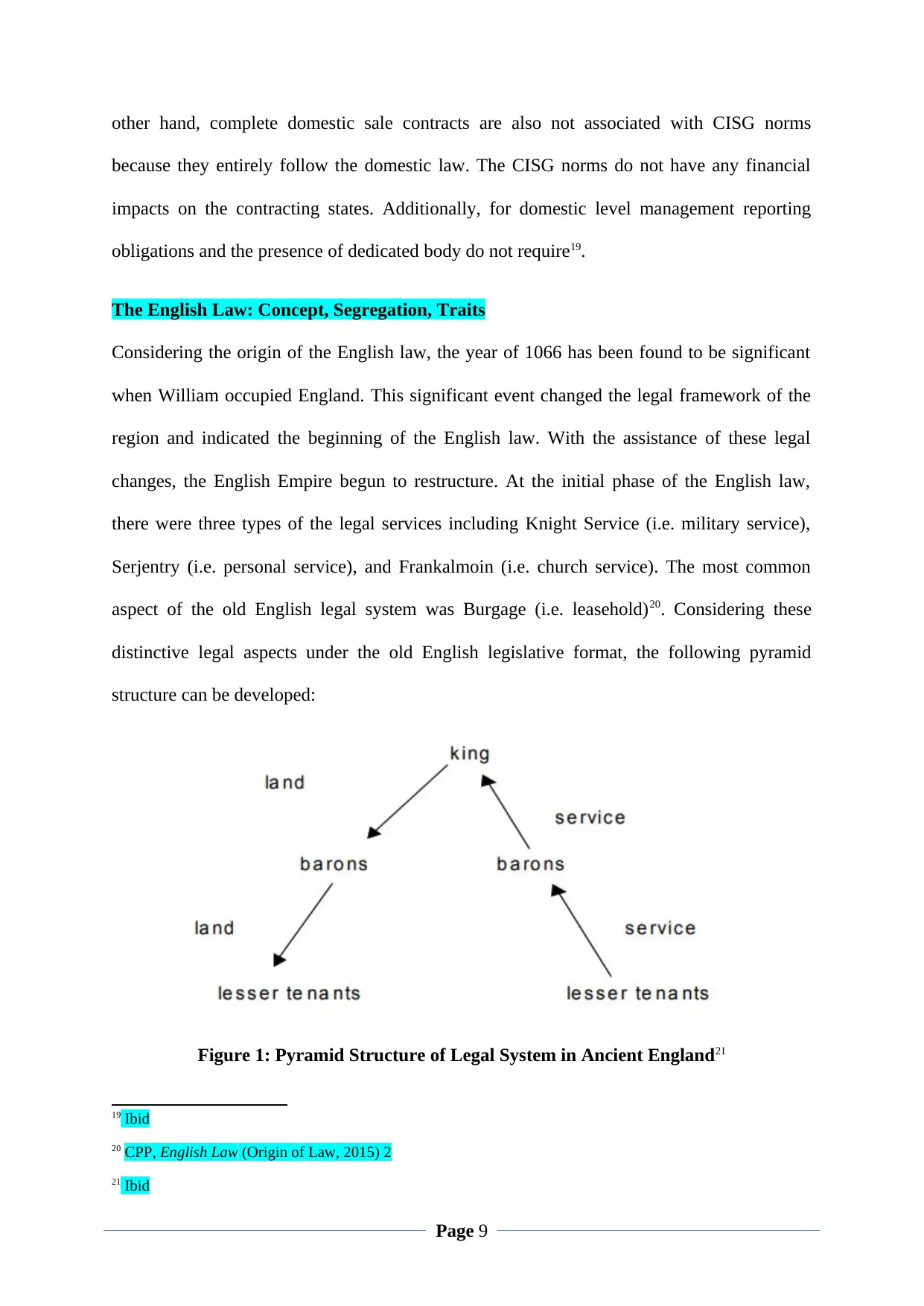
other hand, complete domestic sale contracts are also not associated with CISG norms
because they entirely follow the domestic law. The CISG norms do not have any financial
impacts on the contracting states. Additionally, for domestic level management reporting
obligations and the presence of dedicated body do not require19.
The English Law: Concept, Segregation, Traits
Considering the origin of the English law, the year of 1066 has been found to be significant
when William occupied England. This significant event changed the legal framework of the
region and indicated the beginning of the English law. With the assistance of these legal
changes, the English Empire begun to restructure. At the initial phase of the English law,
there were three types of the legal services including Knight Service (i.e. military service),
Serjentry (i.e. personal service), and Frankalmoin (i.e. church service). The most common
aspect of the old English legal system was Burgage (i.e. leasehold)20. Considering these
distinctive legal aspects under the old English legislative format, the following pyramid
structure can be developed:
Figure 1: Pyramid Structure of Legal System in Ancient England21
19 Ibid
20 CPP, English Law (Origin of Law, 2015) 2
21 Ibid
Page 9
because they entirely follow the domestic law. The CISG norms do not have any financial
impacts on the contracting states. Additionally, for domestic level management reporting
obligations and the presence of dedicated body do not require19.
The English Law: Concept, Segregation, Traits
Considering the origin of the English law, the year of 1066 has been found to be significant
when William occupied England. This significant event changed the legal framework of the
region and indicated the beginning of the English law. With the assistance of these legal
changes, the English Empire begun to restructure. At the initial phase of the English law,
there were three types of the legal services including Knight Service (i.e. military service),
Serjentry (i.e. personal service), and Frankalmoin (i.e. church service). The most common
aspect of the old English legal system was Burgage (i.e. leasehold)20. Considering these
distinctive legal aspects under the old English legislative format, the following pyramid
structure can be developed:
Figure 1: Pyramid Structure of Legal System in Ancient England21
19 Ibid
20 CPP, English Law (Origin of Law, 2015) 2
21 Ibid
Page 9
⊘ This is a preview!⊘
Do you want full access?
Subscribe today to unlock all pages.

Trusted by 1+ million students worldwide
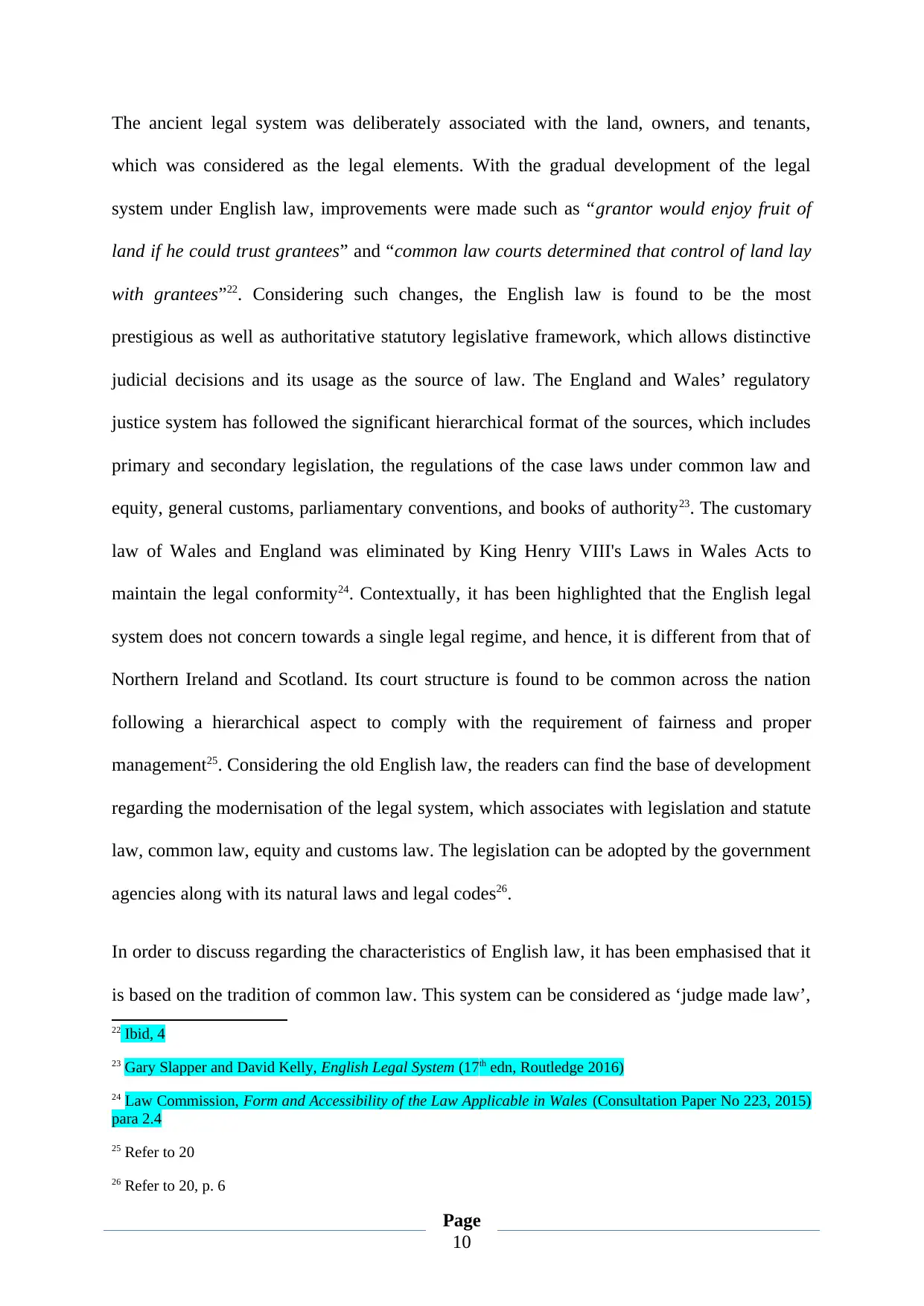
The ancient legal system was deliberately associated with the land, owners, and tenants,
which was considered as the legal elements. With the gradual development of the legal
system under English law, improvements were made such as “grantor would enjoy fruit of
land if he could trust grantees” and “common law courts determined that control of land lay
with grantees”22. Considering such changes, the English law is found to be the most
prestigious as well as authoritative statutory legislative framework, which allows distinctive
judicial decisions and its usage as the source of law. The England and Wales’ regulatory
justice system has followed the significant hierarchical format of the sources, which includes
primary and secondary legislation, the regulations of the case laws under common law and
equity, general customs, parliamentary conventions, and books of authority23. The customary
law of Wales and England was eliminated by King Henry VIII's Laws in Wales Acts to
maintain the legal conformity24. Contextually, it has been highlighted that the English legal
system does not concern towards a single legal regime, and hence, it is different from that of
Northern Ireland and Scotland. Its court structure is found to be common across the nation
following a hierarchical aspect to comply with the requirement of fairness and proper
management25. Considering the old English law, the readers can find the base of development
regarding the modernisation of the legal system, which associates with legislation and statute
law, common law, equity and customs law. The legislation can be adopted by the government
agencies along with its natural laws and legal codes26.
In order to discuss regarding the characteristics of English law, it has been emphasised that it
is based on the tradition of common law. This system can be considered as ‘judge made law’,
22 Ibid, 4
23 Gary Slapper and David Kelly, English Legal System (17th edn, Routledge 2016)
24 Law Commission, Form and Accessibility of the Law Applicable in Wales (Consultation Paper No 223, 2015)
para 2.4
25 Refer to 20
26 Refer to 20, p. 6
Page
10
which was considered as the legal elements. With the gradual development of the legal
system under English law, improvements were made such as “grantor would enjoy fruit of
land if he could trust grantees” and “common law courts determined that control of land lay
with grantees”22. Considering such changes, the English law is found to be the most
prestigious as well as authoritative statutory legislative framework, which allows distinctive
judicial decisions and its usage as the source of law. The England and Wales’ regulatory
justice system has followed the significant hierarchical format of the sources, which includes
primary and secondary legislation, the regulations of the case laws under common law and
equity, general customs, parliamentary conventions, and books of authority23. The customary
law of Wales and England was eliminated by King Henry VIII's Laws in Wales Acts to
maintain the legal conformity24. Contextually, it has been highlighted that the English legal
system does not concern towards a single legal regime, and hence, it is different from that of
Northern Ireland and Scotland. Its court structure is found to be common across the nation
following a hierarchical aspect to comply with the requirement of fairness and proper
management25. Considering the old English law, the readers can find the base of development
regarding the modernisation of the legal system, which associates with legislation and statute
law, common law, equity and customs law. The legislation can be adopted by the government
agencies along with its natural laws and legal codes26.
In order to discuss regarding the characteristics of English law, it has been emphasised that it
is based on the tradition of common law. This system can be considered as ‘judge made law’,
22 Ibid, 4
23 Gary Slapper and David Kelly, English Legal System (17th edn, Routledge 2016)
24 Law Commission, Form and Accessibility of the Law Applicable in Wales (Consultation Paper No 223, 2015)
para 2.4
25 Refer to 20
26 Refer to 20, p. 6
Page
10
Paraphrase This Document
Need a fresh take? Get an instant paraphrase of this document with our AI Paraphraser
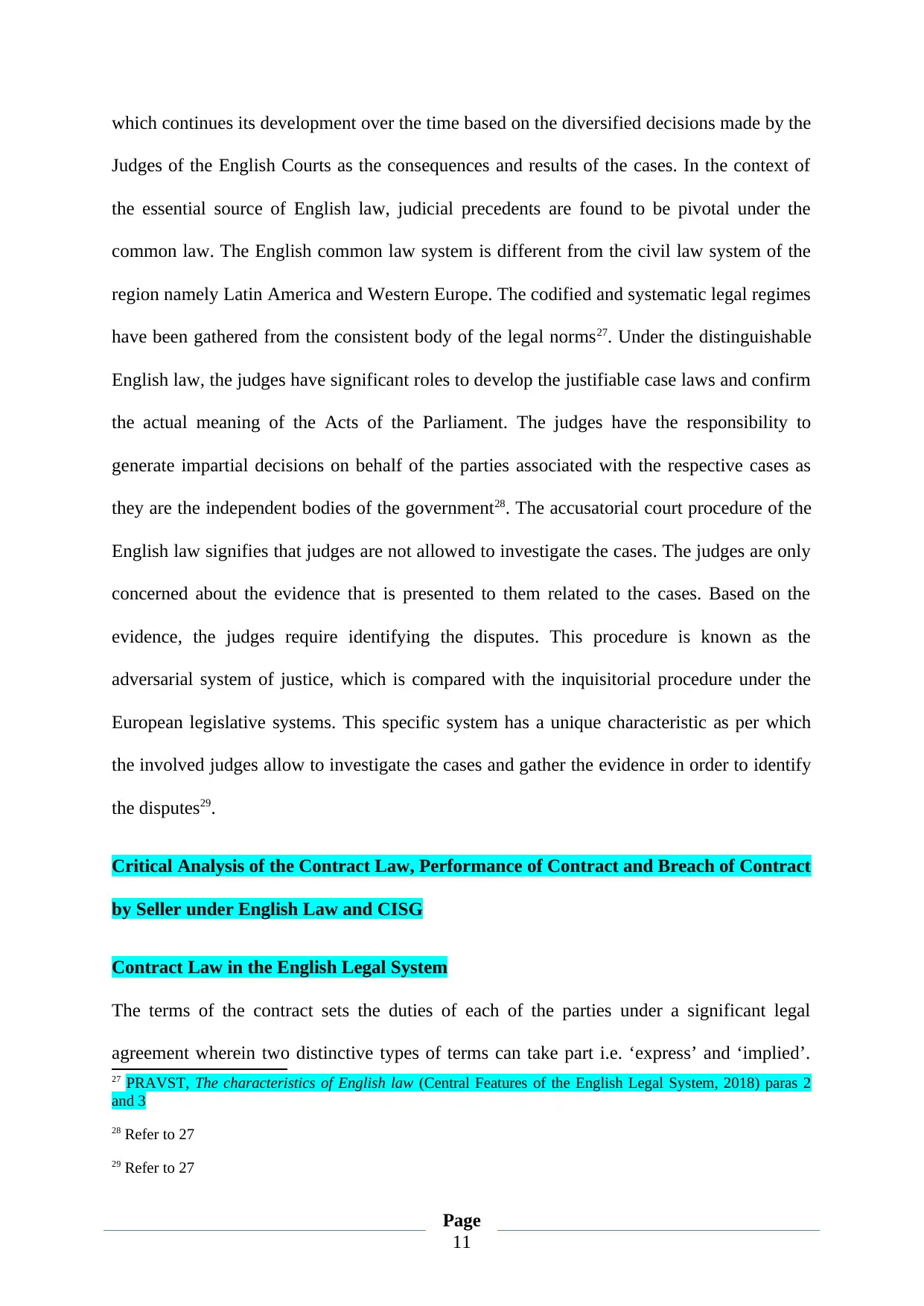
which continues its development over the time based on the diversified decisions made by the
Judges of the English Courts as the consequences and results of the cases. In the context of
the essential source of English law, judicial precedents are found to be pivotal under the
common law. The English common law system is different from the civil law system of the
region namely Latin America and Western Europe. The codified and systematic legal regimes
have been gathered from the consistent body of the legal norms27. Under the distinguishable
English law, the judges have significant roles to develop the justifiable case laws and confirm
the actual meaning of the Acts of the Parliament. The judges have the responsibility to
generate impartial decisions on behalf of the parties associated with the respective cases as
they are the independent bodies of the government28. The accusatorial court procedure of the
English law signifies that judges are not allowed to investigate the cases. The judges are only
concerned about the evidence that is presented to them related to the cases. Based on the
evidence, the judges require identifying the disputes. This procedure is known as the
adversarial system of justice, which is compared with the inquisitorial procedure under the
European legislative systems. This specific system has a unique characteristic as per which
the involved judges allow to investigate the cases and gather the evidence in order to identify
the disputes29.
Critical Analysis of the Contract Law, Performance of Contract and Breach of Contract
by Seller under English Law and CISG
Contract Law in the English Legal System
The terms of the contract sets the duties of each of the parties under a significant legal
agreement wherein two distinctive types of terms can take part i.e. ‘express’ and ‘implied’.
27 PRAVST, The characteristics of English law (Central Features of the English Legal System, 2018) paras 2
and 3
28 Refer to 27
29 Refer to 27
Page
11
Judges of the English Courts as the consequences and results of the cases. In the context of
the essential source of English law, judicial precedents are found to be pivotal under the
common law. The English common law system is different from the civil law system of the
region namely Latin America and Western Europe. The codified and systematic legal regimes
have been gathered from the consistent body of the legal norms27. Under the distinguishable
English law, the judges have significant roles to develop the justifiable case laws and confirm
the actual meaning of the Acts of the Parliament. The judges have the responsibility to
generate impartial decisions on behalf of the parties associated with the respective cases as
they are the independent bodies of the government28. The accusatorial court procedure of the
English law signifies that judges are not allowed to investigate the cases. The judges are only
concerned about the evidence that is presented to them related to the cases. Based on the
evidence, the judges require identifying the disputes. This procedure is known as the
adversarial system of justice, which is compared with the inquisitorial procedure under the
European legislative systems. This specific system has a unique characteristic as per which
the involved judges allow to investigate the cases and gather the evidence in order to identify
the disputes29.
Critical Analysis of the Contract Law, Performance of Contract and Breach of Contract
by Seller under English Law and CISG
Contract Law in the English Legal System
The terms of the contract sets the duties of each of the parties under a significant legal
agreement wherein two distinctive types of terms can take part i.e. ‘express’ and ‘implied’.
27 PRAVST, The characteristics of English law (Central Features of the English Legal System, 2018) paras 2
and 3
28 Refer to 27
29 Refer to 27
Page
11
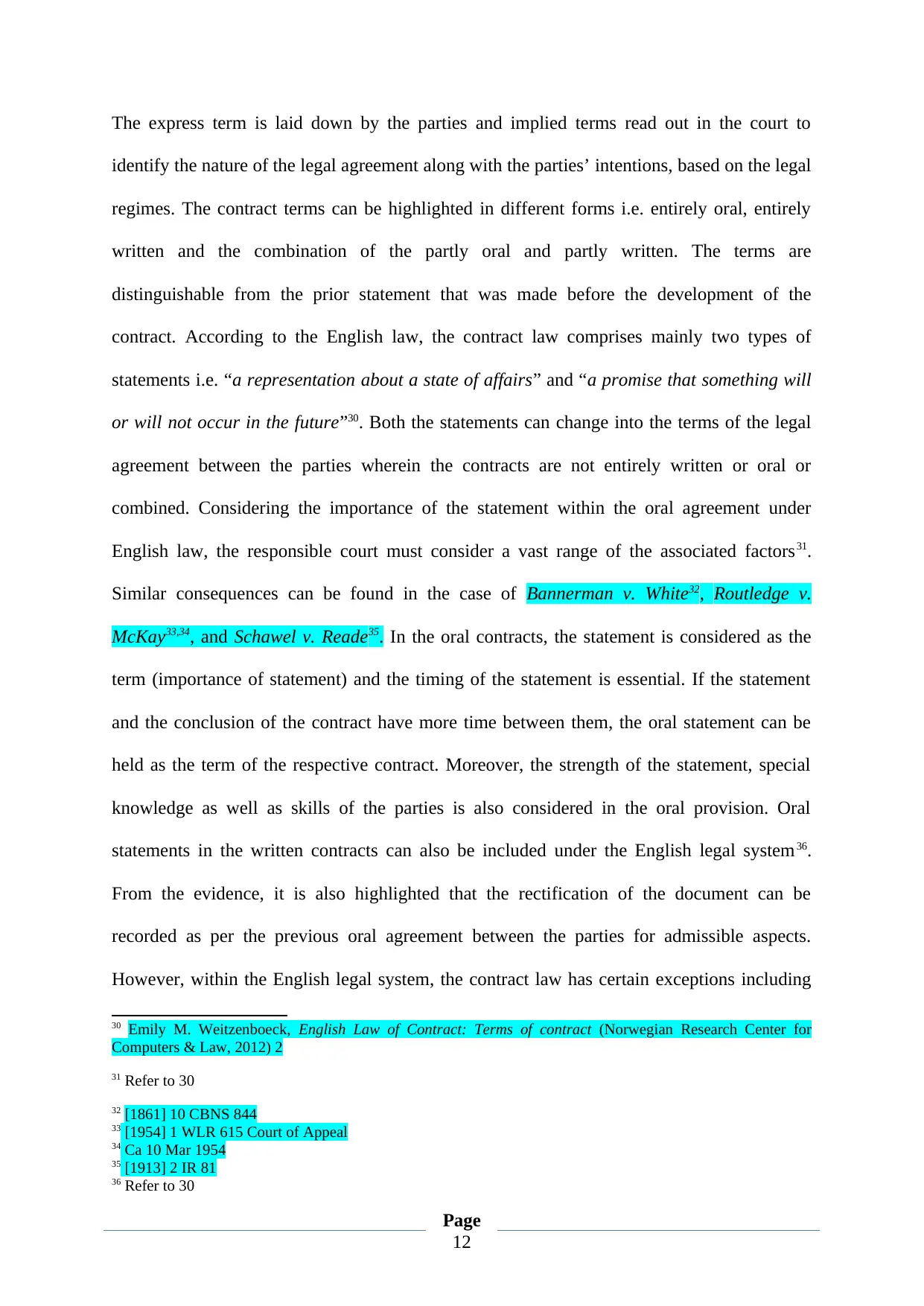
The express term is laid down by the parties and implied terms read out in the court to
identify the nature of the legal agreement along with the parties’ intentions, based on the legal
regimes. The contract terms can be highlighted in different forms i.e. entirely oral, entirely
written and the combination of the partly oral and partly written. The terms are
distinguishable from the prior statement that was made before the development of the
contract. According to the English law, the contract law comprises mainly two types of
statements i.e. “a representation about a state of affairs” and “a promise that something will
or will not occur in the future”30. Both the statements can change into the terms of the legal
agreement between the parties wherein the contracts are not entirely written or oral or
combined. Considering the importance of the statement within the oral agreement under
English law, the responsible court must consider a vast range of the associated factors31.
Similar consequences can be found in the case of Bannerman v. White32, Routledge v.
McKay33,34, and Schawel v. Reade35. In the oral contracts, the statement is considered as the
term (importance of statement) and the timing of the statement is essential. If the statement
and the conclusion of the contract have more time between them, the oral statement can be
held as the term of the respective contract. Moreover, the strength of the statement, special
knowledge as well as skills of the parties is also considered in the oral provision. Oral
statements in the written contracts can also be included under the English legal system36.
From the evidence, it is also highlighted that the rectification of the document can be
recorded as per the previous oral agreement between the parties for admissible aspects.
However, within the English legal system, the contract law has certain exceptions including
30 Emily M. Weitzenboeck, English Law of Contract: Terms of contract (Norwegian Research Center for
Computers & Law, 2012) 2
31 Refer to 30
32 [1861] 10 CBNS 844
33 [1954] 1 WLR 615 Court of Appeal
34 Ca 10 Mar 1954
35 [1913] 2 IR 81
36 Refer to 30
Page
12
identify the nature of the legal agreement along with the parties’ intentions, based on the legal
regimes. The contract terms can be highlighted in different forms i.e. entirely oral, entirely
written and the combination of the partly oral and partly written. The terms are
distinguishable from the prior statement that was made before the development of the
contract. According to the English law, the contract law comprises mainly two types of
statements i.e. “a representation about a state of affairs” and “a promise that something will
or will not occur in the future”30. Both the statements can change into the terms of the legal
agreement between the parties wherein the contracts are not entirely written or oral or
combined. Considering the importance of the statement within the oral agreement under
English law, the responsible court must consider a vast range of the associated factors31.
Similar consequences can be found in the case of Bannerman v. White32, Routledge v.
McKay33,34, and Schawel v. Reade35. In the oral contracts, the statement is considered as the
term (importance of statement) and the timing of the statement is essential. If the statement
and the conclusion of the contract have more time between them, the oral statement can be
held as the term of the respective contract. Moreover, the strength of the statement, special
knowledge as well as skills of the parties is also considered in the oral provision. Oral
statements in the written contracts can also be included under the English legal system36.
From the evidence, it is also highlighted that the rectification of the document can be
recorded as per the previous oral agreement between the parties for admissible aspects.
However, within the English legal system, the contract law has certain exceptions including
30 Emily M. Weitzenboeck, English Law of Contract: Terms of contract (Norwegian Research Center for
Computers & Law, 2012) 2
31 Refer to 30
32 [1861] 10 CBNS 844
33 [1954] 1 WLR 615 Court of Appeal
34 Ca 10 Mar 1954
35 [1913] 2 IR 81
36 Refer to 30
Page
12
⊘ This is a preview!⊘
Do you want full access?
Subscribe today to unlock all pages.

Trusted by 1+ million students worldwide
1 out of 26
Related Documents
Your All-in-One AI-Powered Toolkit for Academic Success.
+13062052269
info@desklib.com
Available 24*7 on WhatsApp / Email
![[object Object]](/_next/static/media/star-bottom.7253800d.svg)
Unlock your academic potential
Copyright © 2020–2026 A2Z Services. All Rights Reserved. Developed and managed by ZUCOL.





